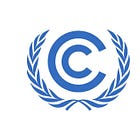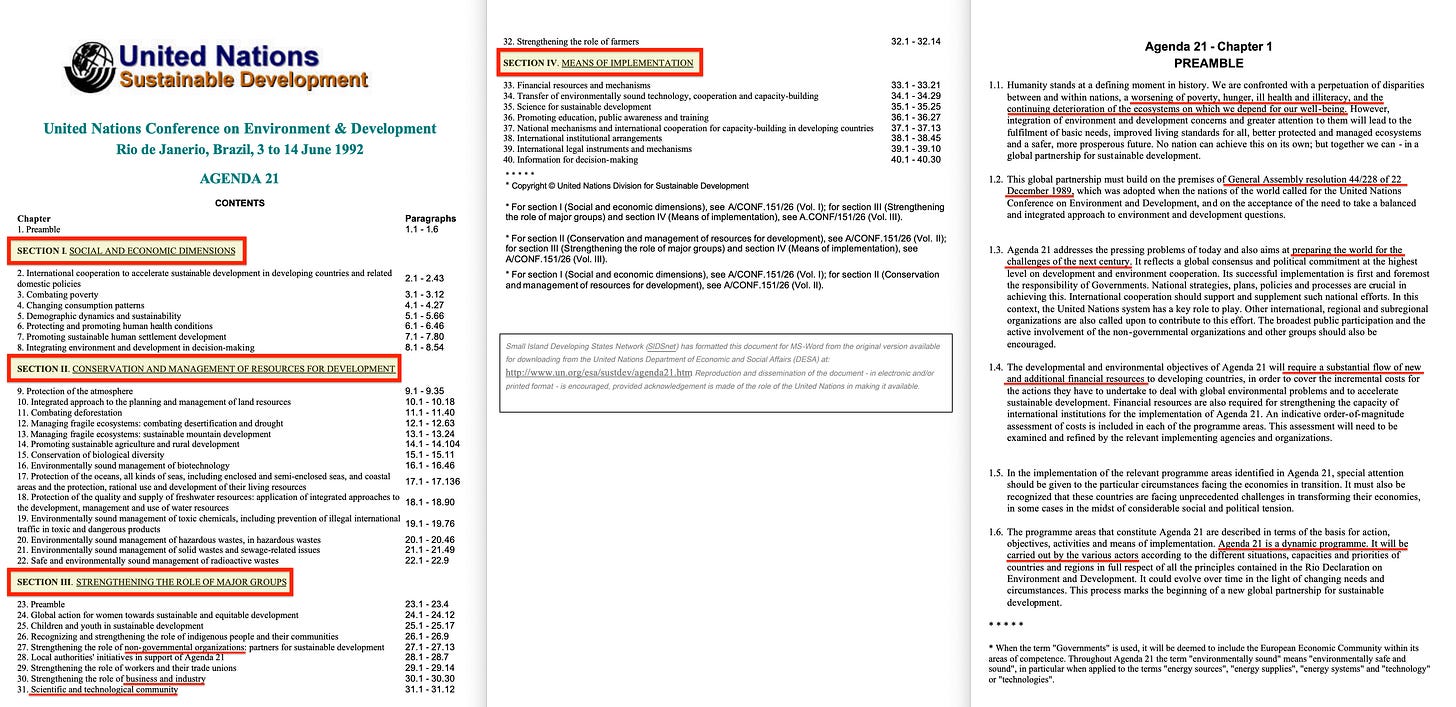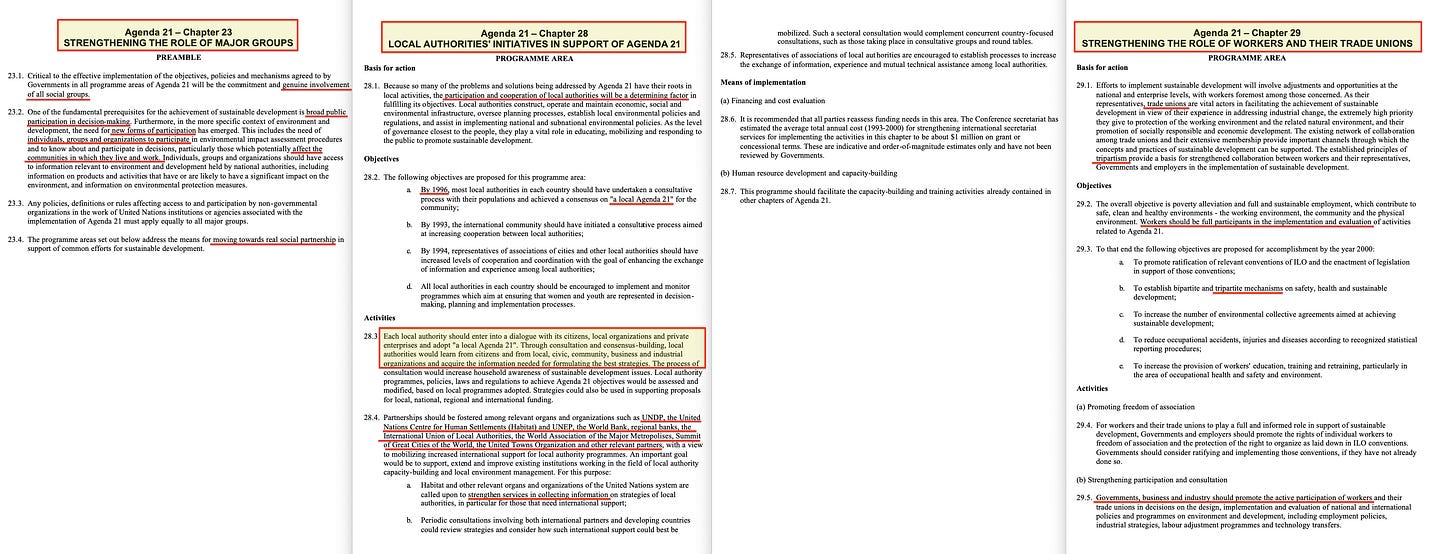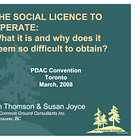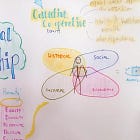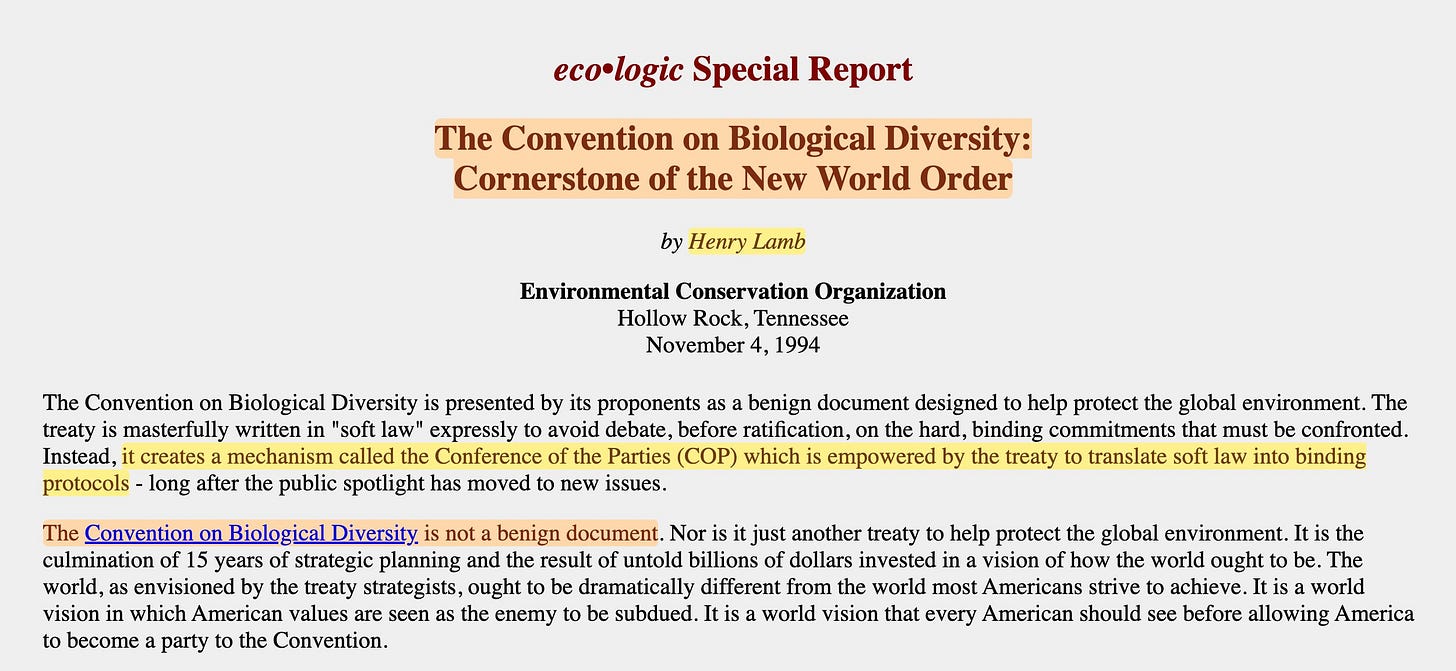Agenda 21
Officially, Agenda 21 is framed as a voluntary action plan, a guideline for achieving economic, social, and environmental sustainability - contextually adapted within local setting.
But what it actually is, is a blueprint for a structured, hierarchical governance system applied on a global scale.
The Earth Summit in Rio brought us not one but two cataclysmic disasters; the United Nations Framework Convention on Climate Change (UNFCCC), and the Convention on Biological Diversity (CBD) - both of which have extensively been addressed on this substack. But the third key document - Agenda 21 - has largely escaped attention.
And there’s a reason for that. See, while it’s generally trivial to slot in the various frameworks, Agenda 21 is somewhat of a slippery fish. It emphasises… rather a lot of things, but generally in a somewhat wishy-washy manner, offering a voluntary approach, or aspirational goals, semi-coded into standards… thus making it hard to pin down exactly what its objective happens to be. And that isn’t the case with the other two key documents; the UNFCCC relates to carbon emissions, and the CBD relates to carbon sequestration - and when the former are used as backing for CBDCs, these lead to the ‘energy certificates’ outlined by Technocracy Inc back in 19361.
But nailing down Agenda 21 itself… that presents itself as somewhat the different kettle of fish. See, while there’s emphasis on a lot of topics - conservation of resources, poverty, human health, social justice, and other socio-economic strata of life - there are no hard laws laid down. It’s a soft law document, through and through, ultimately meaning that you will have somewhat of an uphill struggle, attempting to convince those who… generally don’t want to be convinced…. that the document doesn’t serve their interests. And there’s a reason for that. A meta-reason, in fact. See, what the document actually seeks to do, is to define the future global governance structure. And that is entirely timely, because the Commission on Global Governance2 was similarly launched in 1992, and that ultimately went on to produce the report ‘Our Global Neighbourhood’ previously discussed.
But let’s dive into Agenda 213 itself. And from first look, it… appears to focus on the (1) ‘social and economic dimensions’, (2) ‘conservation and management of resouces for development‘, (3) ‘strengthening the role of major groups‘, and (4) ‘means of implementation’. And these then further break into the likes of (1) ‘combating poverty’, ‘changing consumption patterns’, (2) ‘combating deforestation‘, ‘environmentally sound management of biotechnology‘, (3) ‘children and youth in sustainable development’, ‘strengthening the role of farmers‘, (4) ‘science for sustainable development‘, and ‘information for decision-making’.
But dive into particulars, and you’ll find that Agenda 21 does not introduce or even suggest anything concrete; the document entirely comprises ‘soft’ guidelines - not legally binding, and with little stated in terms of monitoring or enforcement. Overall, it’s a wishy-washy document chock full of aspirational outlines, without much of a way in terms of describing how said stated objectives should be reached.
And the preamble… carries on in much the same vein, offering the typical, alarmist phrasing we’ve witnessed across a range of document prior to this one -
‘Humanity stands at a defining moment in history… a perpetuation of disparities between and within nations, a worsening of poverty, hunger, ill health and illiteracy, and the continuing deterioration of the ecosystems on which we depend for our well-being‘
… before predictable offering ‘hope’, though this naturally comes at an exceedingly high price in very monetary terms. Only one minor inclusion in the preamble yields somewhat of a hint as to where this is all going -
‘Agenda 21 is a dynamic programme. It will be carried out by the various actors according to the different situations, capacities and priorities of countries and regions…‘
And as for those actors… well, those are outlined in section 3, titled -
‘Strengthening the role of major groups‘
The document spans 351 pages, but fortunately, most is… not terribly interesting. Section 2 can be broadly understood as addressing ‘what needs to be done with our environment’; Section 1 outlines ‘how human societies fit into sustainable development‘; Section 3 describes ‘who should have a larger role in executing this vision’; and Section 4 ultimately describes ‘who should pay for it’.
And given that Agenda 21 mostly offers non-binding, aspirational guidelines, we can for this purpose largely ignore sections 1 and 2, while section 4 outlines funding responsibilities, which per traditional North-South arrangements ensure that Western taxpayers foot the bills. Consequently, Section 3 is of primary interest. And that means we can skip straight to Chapter 23 - ‘Strengthening the Role of Major Groups’ - on page 270, from which we quickly establish that -
‘Critical to the effective implementation of the objectives, policies and mechanisms agreed to by Governments in all programme areas of Agenda 21 will be the commitment and genuine involvement of all social groups.‘
… and to that extent -
‘…broad public participation in decision-making. Furthermore, in the more specific context of environment and development, the need for new forms of participation has emerged. This includes the need of individuals, groups and organizations to participate in environmental impact assessment procedures and to know about and participate in decisions, particularly those which potentially affect the communities in which they live and work…‘
We do have a democratic decision-making process, but apparently that’s no longer enough. Fortunately, we are promised a detailed explanation through -
‘The programme areas set out below address the means for moving towards real social partnership in support of common efforts for sustainable development…‘
Either way, let’s skip to Chapter 28 from which we learn -
‘Each local authority should enter into a dialogue with its citizens, local organizations and private enterprises and adopt "a local Agenda 21". Through consultation and consensus-building, local authorities would learn from citizens and from local, civic, community, business and industrial organizations and acquire the information needed…‘
… that each local authority should straddle outside of democratic principle, and engage with… just about everyone not elected democratically. And chapter 29 continues, in much the same vein -
‘Governments, business and industry should promote the active participation of workers and their trade unions in decisions on the design, implementation and evaluation of national and international policies and programmes…‘
Look, it might sound good, but the reality is that policy should be set by those you can hold democratically responsible. This blurs that clearly defined line.
Now, let’s return to chapter 27, probably the most important in this document -
‘Non-governmental organizations play a vital role in the shaping and implementation of participatory democracy... Formal and informal organizations, as well as grass-roots movements, should be recognized as partners in the implementation of Agenda 21. The nature of the independent role played by non-governmental organizations within a society calls for real participation…‘
To the best of my knowledge, ours is a ‘liberal democracy’ and we had no consultation wrt replacing that with a ‘participatory democracy’.
‘… non-governmental organizations, therefore, offers a global network that should be tapped, enabled and strengthened in support of efforts to achieve these common goals‘
… and of whose common goals do we speak? The bland objectives set out in sections 1 and 2? And it’s somewhat astonishing how quickly we experience the goalposts being moved yet again, now seeking to include NGOs…
‘… the fullest possible communication and cooperation between international organizations, national and local governments and non-governmental organizations should be promoted in institutions mandated, and programmes designed to carry out Agenda 21‘
… only to immediately be moved to said NGOs being requested access to all spheres of the decision making process. And should you be in doubt thereof -
‘… for the involvement of these organizations at all levels from policy-making and decision-making to implementation.‘
… even managing to include implementation. And all of that on a single page. We’re then treated to a request of this integration taking place within the United Nations system, before the goalpost is moved even further via 27.9.e -
‘Promote and allow non-governmental organizations and their self-organized networks to contribute…‘
… thus handing said NGOs the power to include anyone within their own network, meaning a ‘super-NGO’ can include any NGO to their liking, without a shred of democracy involved in the process. And as for governments -
‘Establish or enhance an existing dialogue with non-governmental organizations and their self-organized networks representing various sectors, which could serve to: (i) consider the rights and responsibilities of these organizations…‘
… they should naturally also include just that, even if the NGOs included by said ‘super-NGO’ operate in entirely different spheres of activity. As for local authorities -
‘Encourage and enable partnership and dialogue between local non-governmental organizations and local authorities in activities aimed at sustainable development…‘
… they should facilitate exactly the same, before pushing the goalpost further -
‘Involve non-governmental organizations in national mechanisms or procedures established to carry out Agenda 21, making the best use of their particular capacities, especially in the fields of education, poverty alleviation and environmental protection and rehabilitation‘
In other words, if a non-government organisation is even remotely associated with the wishy-washy definitions set out through sections 1 and 2, they should be included in this process... though the decision to do this rests with said ‘super-NGO’. And as for who foots this bill -
‘… costs will be involved at the international and national levels in enhancing consultative procedures and mechanisms. Non-governmental organizations will also require additional funding in support of their establishment of, improvement of or contributions to Agenda 21 monitoring systems…‘
… well, don’t ask silly questions. Now, cough up.
Chapter 30 continues on the topic of enterprise -
‘A positive contribution of business and industry, including transnational corporations, to sustainable development can increasingly be achieved by using economic instruments such as free market mechanisms in which the prices of goods and services should increasingly reflect the environmental costs of their input, production, use, recycling and disposal subject to country-specific conditions…‘
… well, golly gee whiz, that’s where the ‘market-based instruments’ concurrently developed through the UNCTAD rears their ugly head.
And as for the belief that business is senior in this arrangement -
‘Governments should identify and implement an appropriate mix of economic instruments and normative measures such as laws, legislations and standards, …‘
… given the context of environmentalism, that slots right in with Tony Blair’s 1991 article in Marxism Today.
And next, the incessantly moving goalpost is back on the move -
‘The mix would include regulatory measures, economic incentives and streamlining of administrative procedures to assure maximum efficiency in dealing with applications for approval in order to facilitate investment decisions, advice and assistance with information, infrastructural support and stewardship responsibilities…‘
… through an indirect call for a Social License to Operate. And incidentally, Tony Blair very much hinted at much the same in his Marxism Today article.
And to wrap up this chapter -
‘Business and industry, including transnational corporations, should ensure responsible and ethical management of products and processes from the point of view of health, safety and environmental aspects... self-regulation, guided by appropriate codes, charters and initiatives integrated into all elements of business planning and decision-making‘
… these principles of ‘ethical managemement’ should be integrated into… absolutely anything and everything related to free enterprise.
But it’s not just a matter of business being saddled with opaque definitions of ‘ethics’, no, chapter 31 details the scientific community experience much the same -
‘The adoption and implementation of ethical principles and codes of practice for the scientific and technological community that are internationally accepted could enhance professionalism and may improve and hasten recognition…‘
… and those ‘ethical principles’ should be applied, globally. And - purely coincidental, I’m sure - in 1996, ICSU SCRES saw the light of day, followed by UNESCO COMEST in 1997. And these two deal with the scientific community in all matters internal (SCRES), and external (COMEST).
And as for said ‘ethics’ -
‘Strengthening and establishing national advisory groups on environmental and developmental ethics, in order to develop a common value framework between the scientific and technological community and society as a whole…‘
… they should of course relate to a common value framework (ie, centralised), which should (beyond being used for awareness) further -
‘Extending education and training in developmental and environmental ethical issues to integrate such objectives into education curricula and research priorities‘
… be integrated into education and research, and -
‘Reviewing and amending relevant national and international environment and development legal instruments to ensure appropriate codes of practice…‘
… be harmonised on a global scale.
A global ethics code for the sciences, you say?
The search term ‘ethics’ incidentally yields 25 hits in this document, released only the year prior to Hans Kung’s… Global Ethic.
Chapter 38 then seeks to drive all of this home through -
‘The continued active and effective participation of non-governmental organizations, the scientific community and the private sector, as well as local groups and communities, are important in the implementation of Agenda 21‘
… ensuring that the NGOs as well as the now-ethics-bound science community both receive invites to the restructured United Nations within the spheres of economic, social, and ‘related’ activity (whatever that… does not exclude) -
‘… there is a need for institutional arrangements within the United Nations system in conformity with, and providing input into, the restructuring and revitalization of the United Nations in the economic, social and related fields, and the overall reform of the United Nations, including ongoing changes in the Secretariat‘
Fortunately, this is followed by a stated objective relating to Agenda 21 -
‘The overall objective is the integration of environment and development issues at national, subregional, regional and international levels, including in the United Nations system institutional arrangements‘
And that constitutes the opening up of the United Nations decision-making process to especially facilitate the inclusion of -
‘To encourage interaction and cooperation between the United Nations system and other intergovernmental and non-governmental subregional, regional and global institutions and non-governmental organizations in the field of environment and development‘
Could this possibly be made more clear? The United Nations is to be split wide open, so that NGOs can be fused into the decision-making process.
I made this explicit point in the article on Trisectoral Networks. I even detailed how the process was divided into 5 different steps, and outlined how each of these were well-suited to aid the objective, from the perspective of General Consultative Status ECOSOC registered NGOs. But when I wrote that post, I didn’t realise that I was to find a second voice agreeing with my conclusion.
The previously mentioned Commission on Global Governance released its output document - ‘Our Global Neighbourhood’ - in 1995. And while this was previously covered, a very recogniseable voice from the past offers further detail on this sordid document. And that voice is one who… I’ve run into in the past.
I first ran into Henry Lamb through the discovery of his fantastic book, titled ‘The Rise of Global Governance’4. Unfortunately, by the time I discovered this book, I’d already independently established much the same documentory trail as he.
And this further took place after I outlined the Convention on Biological Diversity being from hell itself… a fact he arrived at… 3 decades prior5. But - as said - little did I suspect he was about to showcase his superiority once again.
Because in 1996, Henry Lamb released his thoughts on ‘Our Global Neighbourhood’6… and there’s… somewhat of an overlap with my conclusion.
See, not only does he agree that power in this system is vested with those NGOs, but he further names and shames specifically the IUCN, states that the term ‘public-private-partnerships’ typically is used to describe ‘civil society participation’, before speaking of the ‘right to petition’ recommendation in ‘Our Global Neighbourhood’, which as I outlined in the article on Trisectoral Networks came to pass in 1998.
And he even included the role of… the ‘Global Civic Ethic’ (though, in fairness, I’m not sure he picked up on its directive nature).
I will however add to his pre-amble claim of -
‘Although the difference between "world government" and "global governance" has been compared to the difference between "rape" and "date-rape," the system of governance described in the report is a new system…‘
The most unbelievable thing is that… while the implementation might be new, the concepts can be traced back to Plato, Aristotle, Rome, the Christian Commonwealth, Machiavelli, Hobbes, Locke, the enlightenment, Smith, Kant, the French Revolution, Hegel, Marx, Lenin, Hayek, totalitarianism, rights versus responsibilities, the self-organisation of society, the commodified public sphere, ethics, … and even democratic politics.
And John Ehrenberg’s book7 further provides a hint how this was gradually fused into policy… and its contemporary origin.
Henry Lamb truly is a great loss. He passed away in 2012, leaving behind his epic efforts of deciphering the subversive monster of global governance. And though he appears easily able to defeat me from his grave, I don’t mind in the slightest. In fact, it’s probably good, because my path to establishing much the same took me on somewhat the different trail, which goes to establish that the collective media, working to demonise him wasn’t the least bit more honest back when he was around8. The Mainstream Media has always been pathological liars, it appears.
Henry Lamb, I salute you. Your work has stood the test of time, and I look forward to you soon enough beating me yet again… by several decades from beyond the grave.



